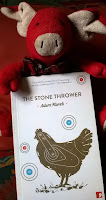
Adam Marek is an award-winning short story writer with two collections under his belt: Instruction Manual for Swallowing and The Stone Thrower. I highly recommend both of these - his short stories are imaginative, surreal at times and yet still full of heart. As a fan I was looking forward to his workshop and came away enthused, inspired and, most importantly, ready to write something new. By the end of the morning I had a flash story drafted and two more short story ideas begging to be developed.
We all shared where we get our ideas from and the range was surprisingly wide. This is my list:
Reading, TV/Film, listening to the radio (R4 usually), swimming, walking, talking to people (I get a lot of story ideas from non-writing friends), listening in to other people's conversations (admit it - we all do this!), titles first then an idea and 'what if' thinking. Adam gave a lovely analogy of how a snowflake needs a piece of grit or dust to form - short stories evolve in much the same way. Many of my stories grow around a tiny element, perhaps a title or a line of dialogue and then develop from there. Adam recommended James Webb Young's A Technique for Producing Ideas (I've just ordered my copy) which covers a simple 5-step plan for producing ideas. The book is aimed at those working in marketing/advertising/sales but the principles work equally for writing. In its simplest form the technique works as follows:
1. Collate your raw material i.e. see my list above.
2. Look for connections. Get yourself worked up into a "peak of frustration."
3. Put it out of your head. Do something else, something completely different - mundane household tasks are perfect for this.
4. The idea should appear when you least expect it. Mine often 'pop' into my head when driving.
5. Consider and evaluate the idea - is it viable? Critically analysis the idea before you do anything with it.
Going to bed and sleeping on it often does the trick for me, letting my subconscious process the ideas without the interference of that dreaded inner critic. It's the same process as James Webb Young describes.
The final half of our workshop was a series of exercises to trigger ideas. In groups we moved around the room to four different 'ideas stations.' Coming together at the end it was interesting to hear that different stimuli worked for different people. Cutting up columns of magazine text and randomly sticking them together to form new sentences worked a treat for some, but did nothing for me. Whereas pairing up disparate images (photos, postcards, magazine pictures) triggered a complete flash story, which I wrote down immediately. The stimuli that worked best for me turned out to be music. Turns out I share the same taste in film soundtracks with Adam - we're both fans of Hans Zimmer (Inception, Gladiator etc) - and he'd created a loop of three or four different pieces of instrumental music. We had to write down the setting that the music evoked and as I'm a very visual writer I was soon immersed in a whole new world - a sci-fi setting and storyline that I'm itching to write.
I feel happier knowing I now have some techniques to trigger creative thinking. Getting out and meeting other writers on the Masterclass also helped. Being around creative people can only stimulate and inspire you.
Adam and others also raved about using Evernote as a virtual scrapbook. I understand you can use it to store images/website links/notes etc. It's something I need to explore. Does anyone else use Evernote? Would you recommend it? And what techniques do you use to generate ideas?
